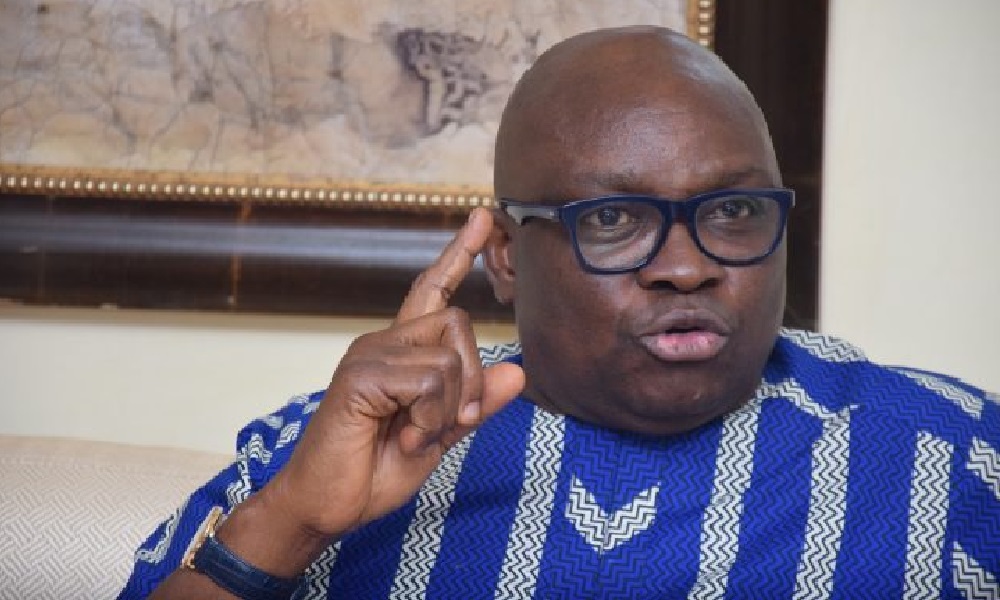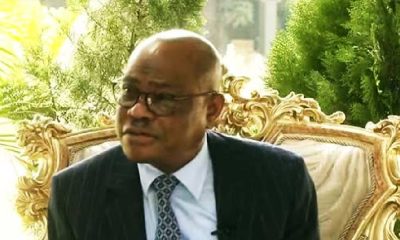News
NNPC Move To Restore Normalcy On Fuel Scarcity In Lagos, FCT

The Nigerian National Petroleum Company Limited (NNPC Limited) has attributed the tightness in fuel supply and distribution witnessed in some part Lagos and FCT to hitch in the discharge operations of a couple of vessels.
The company, in a statement by its spokesperson, Mr Olufemi Soneye, on Saturday, further stated that it was working round the clock with all stakeholders to resolve the situation and restore normalcy in the operations.
The statement comes as some filling stations in Abuja and neighbouring states witnessed total shutdown at weekend as worries spread over planned nationwide protest over economic hardship in the country.
Recalls that only three weeks ago, Nigerians witnessed a resurgence of fuel queues in Abuja and some parts of the country, which NNPC Ltd blamed on disruption of ship-to-ship transfer of Premium Motor Spirit, PMS, also known as petrol, between Mother Vessels and Daughter Vessels resulting from recent thunderstorm.
The company had in a statement, said the adverse weather condition has also affected berthing at jetties, truck load-outs and transportation of products to filling stations, causing a disruption in station supply logistics.
According to the company, “due to flammability of petroleum products and in compliance with the Nigerian Meteorological Agency, NIMET, regulations, it was impossible to load petrol during rainstorms and lightning.
“Adherence to these regulations is mandatory as any deviation could pose severe danger to the trucks, filling stations and human lives.
“Similarly, the development was compounded by consequential flooding of truck routes which has constrained movement of PMS from the coastal corridors to the Federal Capital, Abuja,” it said.
NNPC Ltd however noted that it was working with relevant stakeholders to resolve the logistics challenges and restore seamless supply of petrol to affected areas.
News
INSECURITY: Armed herders attack reportedy leaves family of eight dead, nine others

A family of eight and nine others have been reportedly killed in what appeared to be a coordinated attack by armed herdsmen on communities in Ukum and Logo Local Government Areas (LGAs) of Benue State.
Several people also sustained severe injuries, while many have gone missing.
The attack came less than 24 hours after residents of the area raised the alarm over the influx of AK-47-bearing herders who moved freely around the communities, unrestricted.
A source in the area disclosed that the armed herdsmen stormed Tyuluv, Saror, and Mbawar communities Thursday night, “and started shooting indiscriminately into early Friday and killing several persons and injured many.”
“Before the attack, they came to our communities with thousands of cows armed with AK-47 rifles, but no one could talk to them because they were ready to kill anyone.
“As we speak, people are fleeing their homes, and the painful thing is that nowhere is safe anymore because they are almost everywhere.
“Among those they killed in Ukum was a family of eight, including children and women who could not escape before they got to them.
“From what we heard, the people also attacked neighboring Logo LGA, and this morning, corpses were being moved from the villages to the mortuary at Anyiin. Those killed in the two LGAs were so many.
“From all indications, they want to take over the Sankera axis of Benue State, which is the food basket of the state. It is a dire situation because our people are already preparing to commence the season’s farming, and this is happening. Food is already very expensive in the state, and now this is happening.”
Confirming the development, the Benue State Police Command, in a statement by its Public Relations Officer, Chief Superintendent CSP Catherine Anene, said 17 bodies had been removed from the scenes of the attacks.
Part of the statement read, “On April 17, 2025, at about 9 p.m., information was received that a large number of suspected militia had invaded the Sankera axis of Benue State with the intention to attack communities around Gbagir, Ukum LGA.
“Upon receipt of this report, the Commissioner of Police, Benue State Police Command, Mr. Steve Yabanet, ordered tactical teams to move to the area and join forces with police officers on the ground and other security agencies to forestall the attack.
“Following this order, a team of officers moved to the area and engaged them. While the attackers were being repelled in the early hours of today, they shot sporadically at unsuspecting farmers as they came across them.
Five persons were recovered in the Gbagir area and taken to the hospital, where they were confirmed dead.
“Unfortunately, an unsuspected simultaneous attack was carried out in Logo LGA, where 12 persons were killed before the arrival of the police, making a total of 17 persons.
“However, security agencies within the Sankera axis are still engaging the bandits as they retreat back to the forest around the Taraba axis.
“The Police Commissioner warns social media users who are reporting unconfirmed reports and inciting the general public to desist from such actions that are capable of creating unnecessary tension in the state.
“He reiterates his commitment to fight the attackers and encourages the good people of Sankera to continue to cooperate with the police as the operation is ongoing.”
News
In 2027, if Atiku contests again, I will still vote against him-Fayose promises

Ex-governor of Ekiti state, Ayo Fayose, has disclosed that the 2023 presidential candidate under the Peoples Democratic Party, Atiku Abubakar, will not receive his support if he decides to run in 2027.
”I publicly worked against Atiku, and I am saying for the second time, if Atiku comes again, I will work against him.
“It is time to learn our lesson,” Fayose said on Friday during an interview on Channels Television’s Politics Today.
According to the former governor, the crisis in the party reared its head when the decision to zone power to the North was agreed upon by the leaders.
”After eight years of a Northerner, it is the turn of a Southerner. which could involve someone from the East, South West or South South.”
”Those who gave or zoned power back to the North caused all these problems.”
”You don’t have to like a Nyesom Wike or a Peter Obi, but there should be an unwritten, respected gentleman’s understanding of powershift,” he said.
Fayose, back in 2024, openly declared that he publicly worked against Atiku, adding that his decision was for the good of the country
“Don’t get it wrong. I worked against him (Atiku) 100 per cent. Nigeria is bigger than the PDP, APC.”
Fayose, however, conceded that for party supremacy to thrive in the PDP, it needs to show levels of accountability and avoid abuse and breach of zoning agreements.
”The party must be equitable, the party must be accountable. The party or parent that is irresponsible will produce irresponsible children, they will produce rebellion, they will produce anger.”
”After Asiwaju’s(Bola Tinubu) tenure, if God gives him a chance at a second term. Let a Southerner come out, we as leaders at that time, I will be over 70 or about 70, I will come out straight that a Southerner can not be the President of Nigeria.”
News
CBEX: Ponzi scheme promoters face 10 years jail term, N20m fine

The sudden crash of CBEX, a digital investment platform accused of running a Ponzi scheme that allegedly bolted away with over ₦1.3 trillion (about $850) of depositors’ funds, has thrown many Nigerians into a quandary.
CBEX had promised the gullible Nigerians to double their invested funds within a month, but failed to honour its obligations, sending shock waves running through the spine of thousands of Nigerians, who now face financial ruin after the collapse.
The development sparked widespread reactions, with users expressing frustration, criticism, and concern. Many were reported to have stormed the CBEX office in Oyo State to destroy its belongings.
When it started, CBEX claimed to be a global platform linked to a government-owned business in China. However, Beijing Equity Exchange, in a statement released in 2024, denied any affiliation with the Ponzi scheme. It also claimed to operate offices in Canada and has ties with China. These were never substantiated; rather, CBEX displayed certificates online, such as a US FinCEN registration, while no real branches existed outside Nigeria. Business Insider Africa estimates that about 250,000 to 300,000 Nigerians invested their money in CBEX.
This would have raised a red flag for discerning investors to withdraw their patronage, but that did not happen due to greed and get-rich-quick syndrome.
Following its collapse, the Economic and Financial Crimes Commission (EFCC) announced it would collaborate with Interpol to track down the masterminds, including those possibly hiding overseas.
In the aftermath of the sad development, Chief Economist at SPM Professionals, Paul Alaje, has advocated investment education, highlighting that Nigerians have lost an estimated ₦4.8 trillion to pyramid scams since the collapse of MMM in 2016. “Since MMM in 2016, Nigerians have lost approximately 4.8 trillion to pyramid scams. The pyramid scam is a scheme designed to rip you off of funds. It is only a pyramid scam that promises more interest than the IMF and World Bank put together in a month and sometimes in a week,” Alaje said.
Meanwhile, the Securities and Exchange Commission (SEC) clarified that neither CBEX nor its affiliates were granted registration by the Commission at any time to operate as a Digital Assets Exchange, solicit investments from the public, or perform any other function within the Nigerian capital market.
“Preliminary investigations carried out by the Commission have revealed that CBEX engaged in promotional activities to create a false perception of legitimacy, to entice unsuspecting members of the public into investing monies, with the promise of implausibly high guaranteed returns within a short timeframe.
“CBEX has failed to honour withdrawal requests from their subscribers and abruptly closed their physical offices, amid mounting complaints,” the SEC stated.
The SEC emphasised that under the provisions of Section 196 of the Investments and Securities Act 2025, the Commission would collaborate with relevant law enforcement agencies to take appropriate enforcement action against the CBEX, its affiliates, and promoters.
“The Commission uses this medium to remind the public to REFRAIN from investing in or dealing with any entity offering unrealistic returns or employing similar recruitment-based investment models.
“Prospective investors are advised to VERIFY the registration status of investment platforms via the Commission’s dedicated portal: www.sec.gov.ng/cmos before transacting with them”, the SEC added.
SEC Director General, Dr. Emomotimi Agama, had recently said the Commission is launching a more forceful and coordinated enforcement regime against unregistered and illegal “phony” investment schemes, otherwise known as Ponzi schemes. He said that with the newly enacted Investments and Securities Act, 2025 (ISA 2025), the Commission now has enhanced powers to prosecute Ponzi schemes and their promoters.
According to the SEC, investigations were ongoing on CBEX, adding that promoters of the failed scheme will not go scot-free. Agama said the new law has given the Commission more powers and blocked loopholes in emerging areas of virtual and digital assets.
“The ISA 2025 has given the Commission the legal backing to provide clarity, ensure investor protection, and enhance market confidence, especially in new and previously unregulated segments such as digital asset exchanges and online foreign exchange platforms,” Agama said. He said that while the apex capital market regulator would continue to support innovations in finance and investments, the Commission would maintain strict oversight in line with its enhanced investor protection mandate. “We welcome innovation, but it must occur within a regulated environment that protects investors and maintains the integrity of our market,” Agama said.
He recalled that the SEC had even with the limited scope of the repealed Act, maintained extensive surveillance and was able to shut down a number of Ponzi schemes, with some of the promoters, like Fahmzi Interbiz, jailed for defrauding Nigerians. The ISA 2025 gives the Commission more powers to deal with issues, stressing that the Commission will ensure that promoters of such schemes are not allowed to operate.
Indeed, the performance of the Nigerian capital market has been reinvigorated for sustainable growth in line with global best practices. The market has been modernised with a stronger regulatory framework for financial market infrastructures (FMIs), ensuring stability and reducing systemic risks, notwithstanding the global headwinds occasioned by the Donald Trump tariff war.
Indeed, the Nigerian capital market has been enhanced by the Investments and Securities Bill (ISB) 2025, recently assented to by President Ahmed Bola Tinubu. The landmark legislation, which repeals the Investments and Securities Act No. 29 of 2007, has been described as a major boost to capital market regulation in Nigeria. It strengthens the legal framework of the Nigerian capital market, enhances investor protection, and introduces critical reforms to promote market integrity, transparency, and sustainable growth.
The enactment of the ISA 2025 reaffirms the authority of the Securities and Exchange Commission (SEC) as the apex regulatory authority of the Nigerian Capital Market to regulate the market to ensure capital formation, the protection of investors, and the maintenance of a fair, efficient, and transparent market and reduction of systemic risks. It introduces transformative provisions to further align Nigeria’s market operations with international best practice.
Speaking on key highlights of the Act, Director General of the SEC, Dr. Emomoitimi Agama said, “The Act enhances the regulatory powers of the SEC in a manner comparable with benchmark global securities regulators. These enhanced powers and functions ensure full conformity with the requirements of the International Organization of Securities Commissions (IOSCO) Enhanced Multilateral Memorandum of Understanding (EMMoU), enabling the SEC to retain its “Signatory A” status and enhancing the overall attractiveness of the Nigerian capital market.”
One notable aspect of the ISA 2025 is the recognition of digital assets as securities, providing a legal framework for Virtual Asset Service Providers (VASPs) and Digital Asset Exchanges. For the first time, virtual assets and investment contracts are formally classified as securities under Nigerian law. This brings VASPs, Digital Asset Operators (DAOPs), and Digital Asset Exchanges under the SEC’s regulatory purview, providing a clear legal framework for digital assets.
The new Act provides for “Enforcement Against Illegal Investment Schemes”. It expressly prohibits Ponzi Schemes and other unlawful investment schemes, while prescribing stringent jail terms and other sanctions for the promoters of such schemes. To ensure that illegal fund managers are not allowed to fleece unsuspecting Nigerians of their hard-earned funds, the Act stipulates an express prohibition of Ponzi/Pyramid Schemes and other illegal investment schemes. The Act stipulates that promoters and operators of any entity engaged in a prohibited scheme commit an offence and are liable on conviction to a penalty of not less than N20,000,000 or imprisonment for a term of 10 years or both. This is a transformative step for the capital market, reflecting a commitment to building a dynamic, inclusive, and resilient capital market.
Similarly, salient provisions of the Act address existing restrictions in respect of funds raising from the capital market by Sub-Nationals and their agencies to allow for greater flexibility. State and local governments can now raise funds through the capital markets for public projects like infrastructure or healthcare.
This reduces their reliance on federal allocations or debt, fostering economic development at sub-national levels while increasing transparency in fund utilisation.
Furthermore, transparency in securities transactions has gained traction in the market as the Act introduces the mandatory use of Legal Entity Identifiers (LEIs) by participants in capital market transactions. This stipulation is designed to improve transparency in the conduct of securities transactions.
In the same vein, ISA 2025 introduces a stronger regulatory framework for financial market infrastructures (FMIs), such as clearing houses and central depositories, ensuring stability and reducing systemic risks in Nigeria’s capital markets. It creates a legal framework for commodity exchanges and warehouse receipts, allowing for more structured commodity trading and agricultural financing. This is particularly important for Nigeria’s agricultural and mining sectors, which were not well-integrated into the capital market under the ISA 2007. Under the new law, public companies must obtain SEC consent before engaging in mergers, acquisitions, or issuing securities.
The Act mandates that no public company shall undertake schemes, transactions, arrangements, or issue securities related to corporate actions and restructurings without prior approval from the SEC. The idea is to ensure that corporate restructuring activities comply with market regulations and enhance transparency.
Some other provisions of the Act include Comprehensive Insolvency Provisions for Financial Market Infrastructures, which introduce provisions that exempt transactions facilitated through or otherwise involving Financial Market Infrastructures from the application of general insolvency laws.
Management of Systemic Risk – introduces provisions for the monitoring, management and mitigation of systemic risk in the Nigerian capital market. Expansion of the Category of Issuers to the Public – The Act expands the categories of issuers, as a key step towards the introduction of a wide range of innovative products and offerings as well as the facilitation of “commercial and investment business activities”, subject to the approval of the Commission and other controls stipulated in the Act. Classification of Exchanges and inclusion of provisions on Financial Market Infrastructures – The Act classifies Securities Exchanges into Composite and Non-composite Exchanges. A Composite Exchange is one in which all categories of securities and products can be listed and traded, while a Non-composite Exchange focuses on a singular type of security or product. There are also new provisions on Financial Market Infrastructures such as Central Counter Parties, Clearing Houses, and Trade Depositories.
Comprehensive Insolvency Provisions for Financial Market Infrastructures – The Act introduces provisions that exempt transactions facilitated through or otherwise involving Financial Market Infrastructures from the application of general insolvency laws. Management of Systemic Risk – The Act introduces provisions for the monitoring, management and mitigation of systemic risk in the Nigerian capital market. Expansion of the Category of Issuers to the Public- The Act expands the categories of issuers, as a key step towards the introduction of a wide range of innovative products and offerings as well as the facilitation of “commercial and investment business activities”, subject to the approval of the Commission and other controls stipulated in the Act. Strengthening the Investments and Securities Tribunal – The Act amends some key provisions in the repealed ISA 2007 on the Composition of the Tribunal, constitution of the Tribunal, qualification and appointment of the Chief Registrar, as well as the jurisdiction of the Tribunal to enhance the ability of the Tribunal to discharge its mandate optimally.
The capital market expert said the enactment of ISA 2024 is a welcome development that promises to modernize Nigeria’s investment and securities laws, improve regulatory oversight, protect investors, and support emerging financial technologies.
According to Prof Uche Uwaleke, Director of the Institute of Capital Market Studies at the Nasarawa State University Keffi and President of the Capital Market Academics of Nigeria, “For achieving this feat, the National Assembly Committees on the Capital Market, the Securities and Exchange Commission, and indeed the entire Capital Market community in Nigeria deserve a pat on the back.
“It bears repeating that the ISA 2025 ensures a more transparent, efficient, and competitive capital market consistent with global standards set by the IOSCO. This should strengthen investor confidence, enhance market integrity, encourage foreign investment, and ensure that Nigeria retains its “Signatory A” status under IOSCO’s Enhanced Multilateral Memorandum of Understanding (EMMoU).
-

 News23 hours ago
News23 hours agoJust in: Many Feared Killed In Abuja
-

 News23 hours ago
News23 hours agoPolice clarify on report alleging First Lady’s convoy killed 7-yr-old baby
-

 News21 hours ago
News21 hours agoAbuja raid attack: Three NDLEA officers sustain gunshot injuries, hospitalized
-

 News8 hours ago
News8 hours agoN300m gift: NBA under heavy hammer as FCT minister, Wike alleges body is compromised
-

 News22 hours ago
News22 hours agoEaster: HoR Minority Caucus celebrates with Christians, urges love, peace, national cohesion, calls for end to killings nationwide
-

 News8 hours ago
News8 hours agoUK launches updated English tests for visa, citizenship applicants
-

 News8 hours ago
News8 hours agoStop hunting in southern states, lawmaker begs Northerners
-

 News5 hours ago
News5 hours agoCriminals in military uniform kill 12 at cockfight






